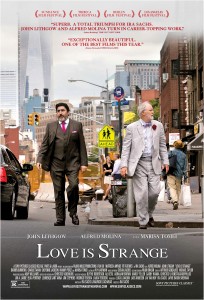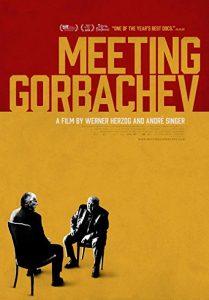Whether you enjoy Ira Sachs’ Love is Strange will depend on your patience and your fondness for films capturing a series of ‘moments’. While the film does utilise a linear narrative, various plot developments go unseen, loose ends abound, and there are a few long, lingering takes that may test the patience of some viewers.
Ben (John Lithgow) and George (Alfred Molina) are middle-class Manhattanites who finally tie the knot after thirty-nine years together. However, their blissful happiness is quickly brought to a halt when George is fired from his music teaching position at a Catholic school after news of their nuptials breaks. Surprisingly, this is not a story about homophobia or gay struggle, but instead is one derived out of a fanciful premise. Losing their main source of income (Ben is retired) the couple are forced to sell their long-owned apartment immediately and seek alternative living arrangements. In the interim between finding a new place to live, they are forced to separate. Ben goes to stay with his nephew, Elliot (Darren Burrows), and Elliot’s wife Kate (Marisa Tomei) and son Joey (Charlie Tahan), while George moves in with his neighbours Ted (Cheyenne Jackson) and Roberto (Manny Perez). This causes a major shift in the dynamics of each household as the two men struggle to live without their other half.

If you can get past this awkward set-up (they have no savings? They couldn’t have stayed anywhere together?) there is much to appreciate in Love is Strange. It is a quietly assured piece which strings together a series of ultra-realistic moments in a not-so-realistic set-up. You can almost smell Ben and George suffocating in their respective settings, and Kate and Joey trying desperately to hold onto their own space. Ben’s presence in her home hinders Kate’s ability to write her book, and teenager Joey, who has to share his bedroom with Ben, loses his much desired privacy. George, on the other hand, is finding it hard to cope with his new housemates’ partying ways, and a growing void in his life now that he is not only temporarily without his partner, but also without his long term job. There are some terrific scenes which capture the uncomfortable dynamics in each household, and the limited interactions between Ben and George will warm the cockles of your heart. Love is Strange is an unusual title, because when they’re together there is nothing strange about it.
The cast are the strongest aspect of the film. Lithgow and Molina are perfect, as is Marisa Tomei. All three deliver beautiful, authentic performances which may be their best to date. The supporting cast initially appears too big, but characters rapidly drop off – in fact one simply disappears – which was mildly jarring, but heightened the element of realism. The main criticism to be made is that there is little exploration into the characters of Ted and Roberto, and the portrayal of Ben and George’s separate living conditions is heavily skewed to Ben’s side.
In addition to the disappearance of a minor player, there are other loose ends that are left to drift, particularly in regards to Joey and his friend Vlad (Eric Tabach). While some viewers will find this a major flaw of the film, a neat ending doesn’t seem necessary here. In the real world, friends come and go, and relationships continue to experience ups and downs. There’s no such thing as a happy ending. Life is about the moments, and Love is Strange is full of them.
Love Is Strange is in Australian cinemas from 19 March through Rialto Distribution.






1 Comment